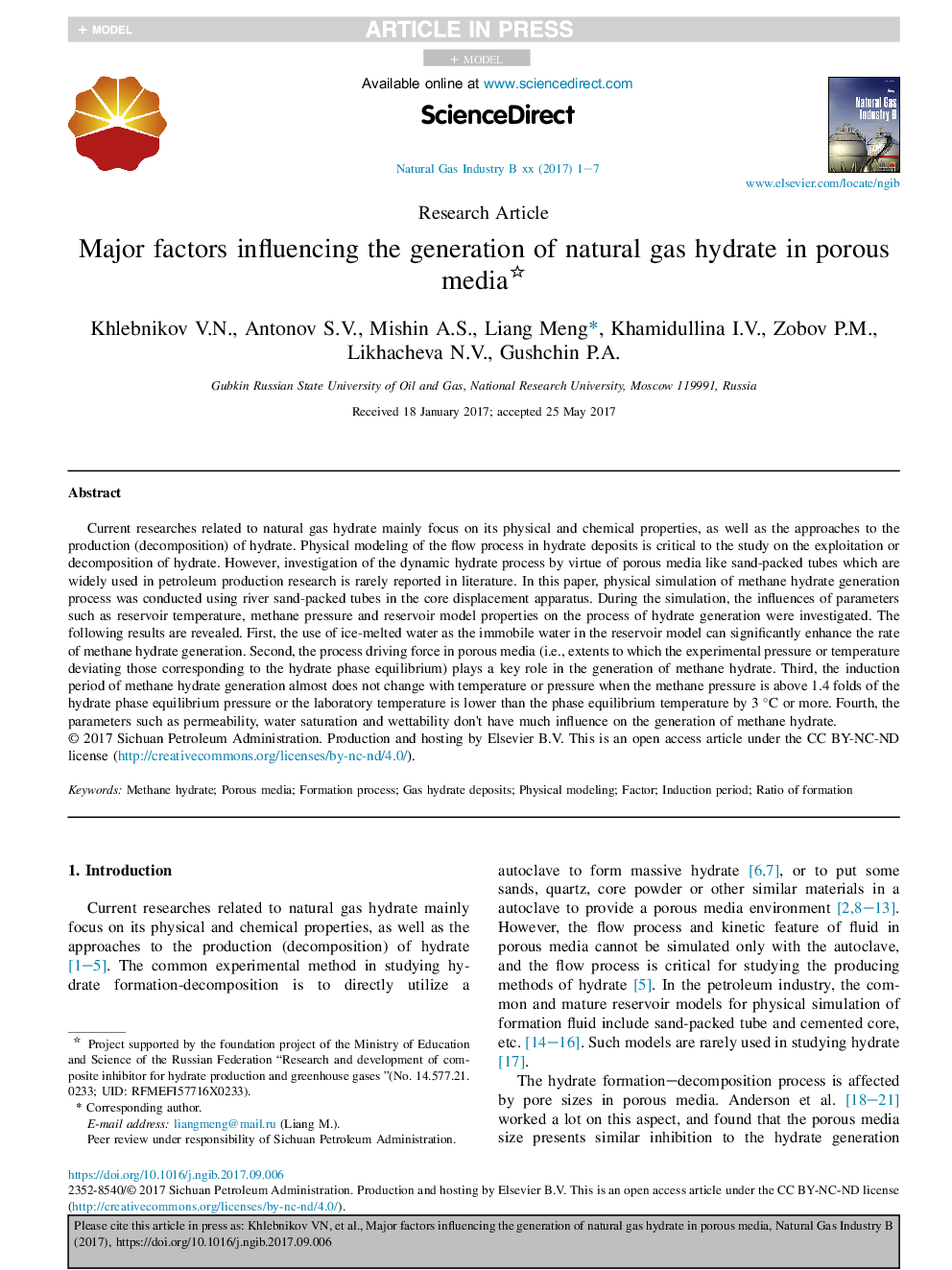| کد مقاله | کد نشریه | سال انتشار | مقاله انگلیسی | نسخه تمام متن |
|---|---|---|---|---|
| 8109643 | 1522257 | 2017 | 7 صفحه PDF | دانلود رایگان |
عنوان انگلیسی مقاله ISI
Major factors influencing the generation of natural gas hydrate in porous media
ترجمه فارسی عنوان
عوامل اصلی تأثیرگذار بر تولید هیدرات گاز طبیعی در رسانه های متخلخل
دانلود مقاله + سفارش ترجمه
دانلود مقاله ISI انگلیسی
رایگان برای ایرانیان
کلمات کلیدی
هیدرات متان، رسانه های متخلخل، فرایند تشکیل، ذخایر هیدرات گاز، مدلسازی فیزیکی، عامل، دوره القایی، نسبت تشکیل
ترجمه چکیده
تحقیقات کنونی مربوط به هیدرات گاز طبیعی عمدتا بر خواص فیزیکی و شیمیایی آن، و همچنین رویکردهای تولید (تجزیه) هیدرات تمرکز می کنند. مدلسازی فیزیکی جریان جریان در رسوبات هیدرات برای بررسی استثمار یا تجزیه هیدرات ضروری است. با این وجود، بررسی پروسه هیدرات دینامیک به دلیل رسانه های متخلخل مانند لوله های بسته بندی شده شن و ماسه که به طور گسترده ای در تحقیقات تولید نفت استفاده می شود، به ندرت در ادبیات گزارش شده است. در این مقاله، شبیه سازی فیزیکی فرآیند تولید هیدرات متان با استفاده از لوله های بسته بندی شده با ماسه رودخانه در دستگاه جابجایی هسته انجام شده است. در طی شبیه سازی، تأثیر پارامترهای مانند دما مخزن، فشار متان و خواص مدل مخزن بر روند تولید هیدرات ها مورد بررسی قرار گرفت. نتایج زیر نشان داده شده است. اولا استفاده از آب یخ ذوب به عنوان آب بی حرکت در مدل مخزن، می تواند به میزان قابل توجهی میزان تولید هیدرات متان را افزایش دهد. دوم، نیروی فرآیند حرکتی در رسانه های متخلخل (به عنوان مثال، به طور گسترده ای که فشار یا دمای آزمایشی انحراف آنها مربوط به تعادل فاز هیدرات است) نقش کلیدی در تولید هیدرات متان دارد. سوم، دوره القایی تولید هیدرات متان تقریبا با دما یا فشار تغییر نمی کند زمانی که فشار متان بالاتر از 1.4 برابر فشار تعادل هیدرات است یا دمای آزمایشگاهی پایین تر از دمای تعادلی فاز است. یا بیشتر. چهارم، پارامترهایی مانند نفوذپذیری، اشباع آب و رطوبت تاثیر زیادی بر تولید هیدرات متان ندارند.
موضوعات مرتبط
مهندسی و علوم پایه
مهندسی انرژی
مهندسی انرژی و فناوری های برق
چکیده انگلیسی
Current researches related to natural gas hydrate mainly focus on its physical and chemical properties, as well as the approaches to the production (decomposition) of hydrate. Physical modeling of the flow process in hydrate deposits is critical to the study on the exploitation or decomposition of hydrate. However, investigation of the dynamic hydrate process by virtue of porous media like sand-packed tubes which are widely used in petroleum production research is rarely reported in literature. In this paper, physical simulation of methane hydrate generation process was conducted using river sand-packed tubes in the core displacement apparatus. During the simulation, the influences of parameters such as reservoir temperature, methane pressure and reservoir model properties on the process of hydrate generation were investigated. The following results are revealed. First, the use of ice-melted water as the immobile water in the reservoir model can significantly enhance the rate of methane hydrate generation. Second, the process driving force in porous media (i.e., extents to which the experimental pressure or temperature deviating those corresponding to the hydrate phase equilibrium) plays a key role in the generation of methane hydrate. Third, the induction period of methane hydrate generation almost does not change with temperature or pressure when the methane pressure is above 1.4 folds of the hydrate phase equilibrium pressure or the laboratory temperature is lower than the phase equilibrium temperature by 3 °C or more. Fourth, the parameters such as permeability, water saturation and wettability don't have much influence on the generation of methane hydrate.
ناشر
Database: Elsevier - ScienceDirect (ساینس دایرکت)
Journal: Natural Gas Industry B - Volume 4, Issue 6, November 2017, Pages 442-448
Journal: Natural Gas Industry B - Volume 4, Issue 6, November 2017, Pages 442-448
نویسندگان
V.N. Khlebnikov, S.V. Antonov, A.S. Mishin, Meng Liang, I.V. Khamidullina, P.M. Zobov, N.V. Likhacheva, P.A. Gushchin,
